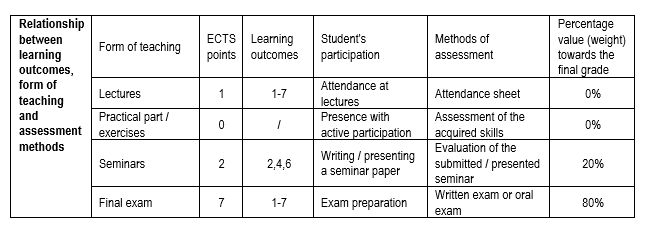The main objective of this course is to present the student with the latest knowledge from health care management
Management of health care within the framework of the European Union, the need for cross-border healthcare in the region, its conditions and health/aspects of public and mental health through assistance to disadvantaged groups, such as ethnic minorities or migrants, and raising to a higher level and harmonisation of health care systems at regional, cross-border level. Structure of the EU
Its administrative bodies, the role of tasks, the internal organisation of the Directorate-General for Health and Consumer Voice and the role of all EU health agencies, as well as the decision-making methods at EU level. New EU health priorities for the period 2014-20. Guidelines for the implementation of EU health priorities, as well as the possibilities and modalities of submitting applications for the allocation of funds and their use for the purpose of improving health infrastructure and services at local, regional and international level. Getting acquainted with special health problems and health care for ethical minorities such as the Roma people. Globe migration and occurrence of certain infectious diseases. The risk of importing rare infectious diseases and multifaceted microorganisms (multidrug-resistant tuberculosis).
Obavezna literatura:
- Balen S. Menadžment u zdravstvu. Osijek: Medicinski fakultet Osijek; 2015.
Dopunska literatura:
Commission of the European Communities. EU Health Strategy. Brussels: 2007. Dostupno na: https://ec.europa.eu/health/policies/background/review/strategy_hr
World Health Organization. Health 2020: A European policy framework and strategy for the 21st century. Copenhagen, Danska: WHO; 2013. Dostupno na: https://www.euro.who.int/en/publications/abstracts/health-2020.-a-european-policy-framework-and-strategy-for-the-21st-century-2013
Upon completion of this course, students will be able to:
- valorize the elements of the management and human resource management;
- self-evaluate skills of interpersonal communication, listening, non-verbal communication, informal communication, conducting effective meetings, presentations;
- justify ways of delegating workload, team management and teamwork;
- recommend methods of financial control and financing of health systems;
- determine the specifics of health systems and management goals in health systems;
- support certain skills for conflict management and negotiations;
- critically evaluate globalization, global economy, global manager.



